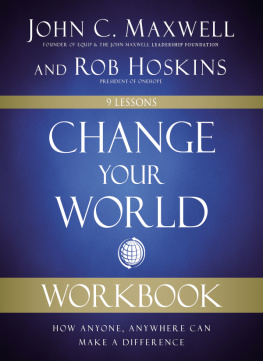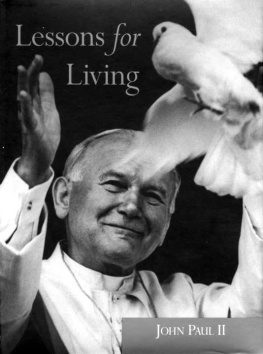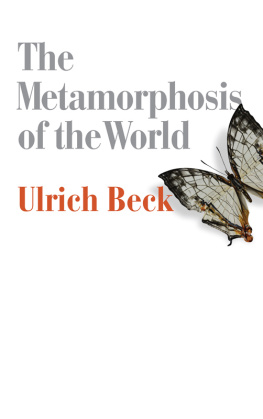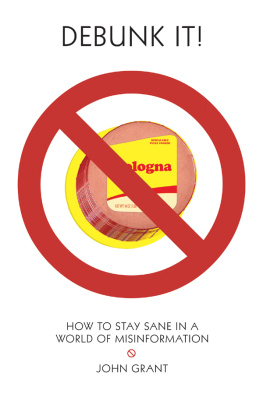
Imperfection is an end. Perfection is only an aim
Ivor Cutler
I. Introduction
If you had the chance, would you change the world? Of course you would. There are plenty of things that you would change right now, if you were given a magic wand.
After all, the world is desperately in need of improvement. So much so that sometimes we lie awake at night, turning over for hours on end as we worry about it. During the day, we huff and curse at the many smaller things that seem wrong. And in sunnier moments we allow ourselves to dream, conjuring parallel worlds that seem entirely delightful.
But whatever our disposition, we often conclude that to change the world would be hard work, if not impossible. And so we dont even try.
Thats a shame, because actively creating change brings benefits for ourselves as individuals, too: we discover deeper reserves of empathy and opportunities to be creative, and we can cultivate a habit of fearlessness. Better still, it turns out that changing the world produces a deep, lasting sense of satisfaction not only when weve finished, as if that were possible, but at each step along the way.
If you have read even this far, you are already interested in changing the world. You may also be confident that you can do something. But not everybody will share that confidence. In which case, its as well to remember that the ideas set down in this book are validated by ancient wisdom and the latest in scientific research. And theyre not merely theoretical, but grounded in historical fact: theyve been shown to work. By the time you have finished reading, you should be better equipped to make change, and also more determined to do so.
To back up the analysis, the book is full of anecdotes, from across history and around the world. Some of these stories are of great historical significance, but I have also included stories from my own life, or from the lives of people I know, precisely in order to show that changing the world is not only the business of great souls like Gandhi, Mother Teresa or Nelson Mandela.
I make no apology for using these personal stories. On the contrary, it would be shameful to argue that everybody is capable of making change if I didnt mention some of my own experiences. They are not intended to seem outstanding: they just happen to be mine. Feminist theory teaches that the personal is the political, and if thats the case then the evidence to prove it will almost by definition appear rather unremarkable. But its evidence all the same, and shows that the small, everyday actions of ordinary individuals have the potential to be world-changing.
The point of this book is not only to offer a few intellectual propositions for you to absorb. We learn best by doing, and a book like this is useful only if you put it into practice. As you are reading, think how it might apply to your own situation.
And then try it.
II. How to Start to Make a Change
1. Overcoming Defeatism
How can I, one individual in a world of billions, hope to change anything? There are many reasons why this kind of defeatist question comes so easily to us. They include the way we have been brought up, a lifetime of putting up with things that frustrate or dismay us, and painful memories of failed attempts to Do Something.
But the fact remains that we are all making a difference all the time. The real problem is that if were only affecting things unconsciously then we are probably not producing the effect we would wish for.
Some people may find it hard to believe they are making a difference all the time. In which case, it may help to abandon the global perspective for a moment and zoom in to our daily human interactions in which we spend every moment either deciding what must happen next or going along with somebody elses ideas. Either way, our actions are all purposeful, and all produce effects. Our day-to-day lives are hardly the stuff of history, you might argue. Certainly not compared with Julius Caesar invading Britain, Genghis Khan sacking Baghdad and Christopher Columbus discovering America. Thats how many people understand history. The history of the world is but the biography of great men, wrote Thomas Carlyle. But the great man theory of history has been on its way out for years. Nowadays, we recognize that those men couldnt have done what they did on their own. And we identify historical significance in hitherto overlooked episodes.
The Russian novelist Leo Tolstoy was one of the first to observe that history should more accurately be considered to consist of the combined effect of the many small things that ordinary individuals do every day: An infinitely large number of infinitesimally small actions.
As Tolstoy saw it, we are making history from the moment we get up in the morning till we go to bed at night. And its not only the things we do that make history, its also the things we dont do. Thats obvious when you think about, say, voting in an election or not. But taken to its logical conclusion it also goes to show that we are making a difference even after going to bed: because we are sleeping instead of, say, working all night on some earthshaking political manifesto, or patrolling the streets to feed the homeless.
And thats fine, by the way: we all need to sleep. But Tolstoys insight requires us to recognize that we are all responsible for the way things are. We are each absolutely essential, each totally irreplaceable, says the Native American activist Leonard Peltier. Each of us is the swing vote in the bitter election battle now being waged between our best and our worst possibilities.
And yet the old idea ingrained in us throughout school, that history is about the actions of dominant individuals, is hard to shake off. Indeed, it seems that, even in democracies, it is positively encouraged.
On the twentieth anniversary of the Berlin Wall coming down, world leaders flew in to Germany to deliver speeches to the listening masses.
It was striking that they came to take credit for this particular historical event, because world leaders had had very little to do with the Walls collapse. In reality, the barrier between East and West Berlin was pulled down because many ordinary Berliners did something very small. Having witnessed people power effecting significant change in several neighbouring countries, and following massive protests elsewhere in East Germany, they merely turned up at the border to see what was going on. Soldiers at the control post, overwhelmed and likewise conscious of what had recently happened in neighbouring countries, opened the way for them to cross freely from one side of the city to the other. Soon after, the wall having ceased to be an effective barrier, it was pulled down. The fact that world leaders took the credit does not diminish the achievement, but does suggest that, when changing the world, we cant necessarily expect recognition for it.
When we talk about the ways the world frustrates us, we often reach for terms like the system or the status quo, and, shrugging, complain that we are powerless. We might do this if a great wall were built through the middle of our city, preventing us from seeing friends and relatives, but also in the face of much lesser hardships. Lets imagine for a moment that we want to hold a street party, but find ourselves obstructed by petty civic regulations that were drawn up for entirely other purposes: we give up. With terms as abstract as the system and the status quo, it can be hard to see our own complicity in the problem. The truth is that we have a choice. We could try to change the regulations that obstruct us, or even disregard them. The choice is entirely ours.
Next page












